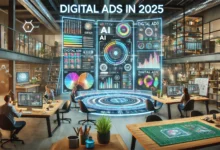Boosting Business Growth with Generative AI in 2025

Intro
Generative AI—The Powerhouse Driving Business Innovation
In 2024, generative AI has emerged as a transformative powerhouse in the business landscape, fundamentally changing how organizations operate. No longer limited to experimental applications, generative AI is now revolutionizing key business functions such as human resources, supply chain management, and marketing. By streamlining processes, cutting costs, and enhancing revenue generation, AI empowers companies to scale efficiently and respond swiftly to market demands.

This surge in generative AI adoption reflects its ability to automate tasks traditionally reliant on significant human input, including content creation, process optimization, and data analysis. However, while the benefits are substantial, businesses must also navigate challenges like inaccuracies, intellectual property (IP) concerns, and cybersecurity threats.
In this article, we explore the impactful applications of generative AI in HR, supply chain, and marketing, while addressing the essential considerations businesses need to consider as they integrate this powerful technology into their operations.
1. Generative AI in Human Resources: Redefining Talent Management
The human resources (HR) function has long been burdened by manual, time-consuming tasks such as screening resumes, conducting initial interviews, and managing employee records. Generative AI is stepping in to automate these processes, allowing HR departments to concentrate on strategic decision-making rather than administrative duties.
One of the most significant impacts of AI in HR is automated recruitment. AI systems can analyze job applications and resumes at scale, identifying top candidates based on criteria like skills, experience, and cultural fit. This technology not only reduces biases that may arise during human screening but also dramatically shortens the time it takes to fill open positions. With AI’s ability to process vast amounts of data, HR teams can cast a wider net, reviewing far more candidates than a human recruiter could manage effectively.
Moreover, AI enhances employee engagement and retention through sentiment analysis on emails, surveys, and internal communications. This allows HR to gauge employee satisfaction and identify potential issues, such as burnout or disengagement before they escalate. By recognizing early warning signs, HR departments can implement targeted interventions—like wellness programs or team-building activities—aimed at improving workplace culture.
AI also plays a pivotal role in learning and development by recommending personalized training programs based on employees’ performance data and career goals. This approach not only boosts employee morale but also ensures that the workforce continually develops the skills needed to meet evolving business demands.
Key Benefits of Generative AI in HR:
- Efficiency: AI significantly reduces the time spent on repetitive tasks like resume screening and interview scheduling.
- Bias Reduction: Automated systems help eliminate human biases in recruitment, promoting a fair hiring process.
- Employee Retention: AI analyzes engagement data to provide insights for timely and effective interventions.
- Personalized Development: Tailored training recommendations enhance employee skills and overall productivity.
However, the growing use of generative AI in HR is not without challenges. Data privacy concerns and the potential for biased algorithms are critical issues that organizations must address. As HR departments increasingly rely on AI, ensuring ethical and secure use of employee data is paramount. Additionally, AI models trained on biased datasets may perpetuate inequalities if not carefully monitored and adjusted.
In the next section, we’ll explore how AI is revolutionizing supply chain management, where the stakes are higher, and the potential benefits even greater.
2. Supply Chain Management: Optimizing Efficiency and Driving Growth with Generative AI
Supply chain management is a critical function in today’s fast-paced business environment, becoming increasingly complex due to globalization, fluctuating market demands, and unexpected disruptions like natural disasters or pandemics. In this high-stakes landscape, generative AI is emerging as a vital tool for optimizing operations, reducing costs, and driving revenue growth.
Generative AI enhances supply chain efficiency by automating data-driven decision-making processes. One of its most significant applications is in demand forecasting. AI models analyze historical sales data, consumer behavior, and market trends to predict future demand with remarkable accuracy.
This capability enables businesses to manage their inventory more effectively, minimizing both shortages and overstock scenarios. By maintaining optimal inventory levels, companies can avoid the costs associated with holding excess stock while ensuring that products are readily available when customers need them.
Another area where AI shines is logistics optimization. AI-powered systems analyze transportation routes and delivery schedules to minimize fuel costs, reduce delivery times, and enhance sustainability by lowering the carbon footprint. This aspect is particularly crucial for companies looking to align with environmental, social, and governance (ESG) standards. By simulating various logistics scenarios, AI allows supply chain managers to select the most efficient and cost-effective options.
Moreover, generative AI plays a significant role in supplier management. By analyzing data from multiple suppliers, AI systems can recommend the best partners based on criteria such as cost, reliability, and proximity. This capability enables businesses to build stronger, more resilient supply chains that are less vulnerable to disruptions.
Recent reports indicate that companies integrating AI into their supply chain operations have experienced revenue increases of over 5% due to more efficient processes and significant cost savings. This statistic underscores the transformative financial impact AI can have when properly implemented in supply chain management.
Key Benefits of Generative AI in Supply Chain Management:
- Accurate Demand Forecasting: AI predicts market trends and demand fluctuations, helping businesses avoid both shortages and excess inventory.
- Optimized Logistics: AI improves route planning and delivery efficiency, reducing operational costs while enhancing sustainability.
- Enhanced Supplier Management: AI identifies the best suppliers based on data, ensuring a more reliable and cost-effective supply chain.
However, businesses must be aware of the risks associated with AI-driven processes. AI models heavily rely on the quality of the data they are trained on; inaccurate or incomplete data can lead to poor decision-making, potentially disrupting the entire supply chain. Additionally, cybersecurity risks must be taken into account, as supply chain data is a prime target for hackers. As AI becomes more embedded in supply chain operations, ensuring the integrity and security of these systems will be critical.
Generative AI is undoubtedly changing the game for supply chain management, providing businesses with powerful tools to operate more efficiently and predictably. In the next section, we’ll explore how AI is transforming marketing and sales, revolutionizing how companies engage with customers and drive revenue.

3. Marketing and Sales: Supercharging Campaigns with Generative AI
In the realms of marketing and sales, generative AI is making a profound impact, enabling businesses to automate, optimize, and personalize their marketing strategies at scale. This revolution not only saves companies valuable time and resources but also enhances their ability to connect with consumers in meaningful and targeted ways.
One of the most significant applications of AI in marketing is content generation. AI-powered tools can create engaging blog posts, social media updates, ad copy, and email campaigns, all tailored to specific customer segments. This capability allows businesses to run hyper-targeted campaigns without needing extensive teams of copywriters or designers. The ability of AI to produce high-quality content quickly and consistently ensures that brands maintain a steady flow of communication with their audience.
Generative AI also excels in personalization. By analyzing customer behavior and preferences, AI can craft tailored marketing messages that resonate with individual consumers. For instance, AI can generate product recommendation emails based on a customer’s past purchases or create customized social media ads, significantly increasing engagement and conversion rates. Industry studies show that businesses using AI-driven marketing strategies can see a 20-30% increase in customer engagement.
In addition to content creation, AI tools are instrumental in analyzing marketing data. By processing vast amounts of consumer and market data, AI systems provide valuable insights into customer behavior, helping marketers identify which strategies are effective and which need adjustment. This data-driven approach allows for smarter budget allocation, ensuring that resources are directed toward the most impactful channels and campaigns.
Generative AI also automates A/B testing, allowing marketers to simultaneously test multiple variations of campaigns and quickly determine which performs best. This real-time feedback enables marketing teams to fine-tune their strategies on the fly, enhancing campaign effectiveness and improving return on investment (ROI).
Moreover, AI is driving innovations in visual marketing. AI-powered tools can design everything from ad visuals to website banners, often outperforming human designers in speed and efficiency. Generative AI models can even create entirely new images or videos based on simple text prompts, making it easier for companies to produce compelling visual content without the need for expensive photo shoots or production teams.
Key Benefits of Generative AI in Marketing and Sales:
- Personalization at Scale: AI generates customized content for different customer segments, enhancing engagement and driving conversions.
- Content Automation: AI rapidly produces high-quality marketing materials, allowing teams to focus on strategy rather than execution.
- Smarter Data Analysis: AI processes large datasets to provide actionable insights, improving campaign effectiveness and efficiency.
- Visual Content Generation: AI tools create compelling visuals, reducing reliance on traditional design resources.
Despite these advantages, businesses must approach AI-generated content with caution. Errors in tone or messaging can lead to brand misalignment, and over-reliance on AI may result in campaigns that feel less personal and human. Additionally, as AI plays a larger role in shaping marketing strategies, concerns around ethical use and the potential for AI-generated content to infringe on intellectual property rights or perpetuate biased outcomes are increasingly pertinent.

Conclusion:
Generative AI—A Catalyst for Business Transformation
Generative AI is not merely a technological advancement; it serves as a catalyst for business transformation across critical functions such as human resources, supply chain management, and marketing. By driving significant improvements in efficiency, cost savings, and revenue generation, generative AI is reshaping how organizations operate in an increasingly competitive landscape.
While the opportunities presented by generative AI are vast, businesses must also remain vigilant about the challenges. Ensuring data accuracy, protecting intellectual property, and addressing cybersecurity concerns are paramount as companies navigate the integration of this powerful technology. Organizations that strategically embrace generative AI will not only enhance their operational capabilities but also position themselves for success in a digital-first world.
As generative AI continues to evolve, its influence will expand further, reshaping even more aspects of business operations. Companies that adapt to this change will find themselves better equipped to thrive amid rapid technological advancements and shifting market dynamics.
Stay ahead of the AI revolution by subscribing to our blog, where we cover the latest trends, tools, and insights that can transform your business operations!









One Comment